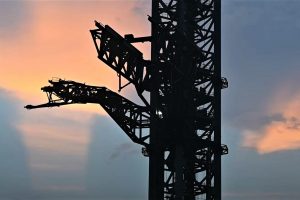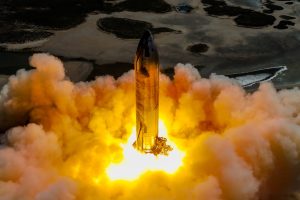- 🚀 SpaceX is preparing for the second test flight of Starship, with a 20-minute launch window opening at 7:00 AM CT (13:00 UTC).
- 🛠 Ship 25 and Booster 9 are involved in the test, featuring upgrades like improved engine shielding and a switch from hydraulic to electric thrust vector controls.
- 🚀 The launch process involves propellant loading, with liquid oxygen and liquid methane being loaded onto Booster 9 and Ship 25 at different times.
- 🚨 Significant milestones include the chilling of 39 Raptor engines, ignition, liftoff, Max Q at T+52 seconds, and hot staging at T+2 minutes and 39 seconds.
- 🚀 Booster 9 will perform a boost backburn, landing burn, and aim for a soft touchdown in the Gulf of Mexico, while Ship 25 continues on a sub-orbital trajectory.
- 🌊 Starship, if it survives atmospheric entry, will splash down in the Pacific Ocean at T+1 hour and 30 minutes after lift-off.
- 📺 SpaceX will livestream the launch on their website and X, starting 35 minutes before lift-off.
After a one-day delay to replace a failed grid fin actuator, SpaceX is now less than 24 hours from the second test flight of Starship. SpaceX will have a 20-minute launch window that opens at 7:00 AM CT (13:00 UTC).
Making this test flight is Ship 25 and Booster 9. Ship 25 is powered by 6 Raptor engines (3 sea level and 3 vacuum), and Booster 9 is powered by 33 Raptor engines.
Booster 9 features many upgrades over the last booster to take flight, including better engine shielding and a switch from hydraulic thrust vector controls to electric TVC. Ship 25 didn’t see as many upgrades as the booster, and not much has been shared of any major changes that were made. One change to both vehicles was the improvement of the Flight Termination System, which took much longer to destroy the rocket than expected during the first test.
Launch Day
T minus 2 hours before the scheduled liftoff, the SpaceX launch director will give the go for propellant loading. This process will begin at t minus 1 hour and 37 minutes, and at this point, Booster 9 will begin loading with both liquid oxygen and liquid methane.
T minus 1 hour and 17 minutes, liquid methane will begin loading onto Ship 25, followed by liquid oxygen 4 minutes later at t minus 1 hour and 13 minutes.
T minus 19 minutes and 40 seconds, the 39 Raptor engines on Booster 9 and Ship 25 will begin chilling to prepare for the extremely cold fuel to flow through and prevent thermal shock to engine hardware.
T minus 10 seconds, the flame deflector installed after the first IFT will begin flowing water.
T minus 3 seconds, Raptor engine ignition begins, and thrust begins to build to allow for liftoff.
LIFT OFF!
T+ 2 seconds, the 2nd Integrated Flight Test should now be officially underway, with Booster 9 thundering away from the orbital launch mount.
T+ 52 seconds, Starship and Booster 9 reach Max Q, the area of maximum dynamic pressure on the vehicle will occur here. If (or most) all Raptor engines on Booster 9 are performing nominally, the vehicle will pass through this fairly quickly.
T+ 2 minutes and 39 seconds, Staging. This will be the first time SpaceX has ever attempted hot staging. Almost all of Booster 9 engines will cut out, and Ship 25 will ignite its Raptor engines to separate from the booster. This is all unknown territory from this point on for SpaceX, as the first test flight did not make it this far. SpaceX has yet to clarify how many Ship 25 engines will ignite during this process.
If all goes well, Booster 9 will begin its flip and boost backburn at t+ 2 minutes and 53 seconds, which will last ~54 seconds. Unlike the Falcon 9, the booster is not designed to perform an entry burn.
T+ 6 minutes and 30 seconds after lift-off, Booster 9 will begin its landing burn for a hopeful soft touchdown in the Gulf of Mexico 18 seconds after landing burn ignition. The planned landing area is ~20 miles (32 km) downrange.
Meanwhile, Ship 25 will continue burning its 6 Raptor engines until t+ 8 minutes and 33 seconds, inserted into a sub-orbital trajectory, and then enter a coast phase until its planned reentry North of the Hawaiian islands.
Landing!
At t+ 1 hour and 17 minutes, Starship will begin feeling the effects of the atmosphere, its first real test for the heatshield. If it survives atmospheric entry, Starship will splash down in the Pacific Ocean at t+ 1 hour and 30 minutes after lift off. SpaceX has said Ship 25 will not attempt a landing burn during this test.
If Starship is able to make it past staging, SpaceX will most likely consider this test a success, but it would be a major accomplishment for Ship 25 to survive entry back through the atmosphere and gather important data for the company.
If you have a chance to make it to South Texas or even the other side of the Rio Grande in Mexico, it’ll be a sight you’ll never forget. If you’re watching from home, SpaceX will begin streaming the launch on X and their website 35 minutes before lift-off.





